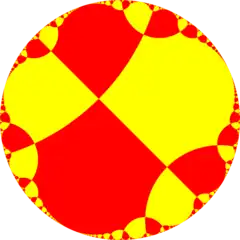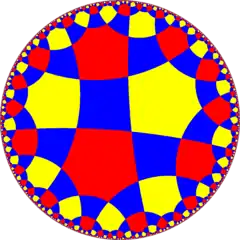Order-6 hexagonal tiling honeycomb
In the field of hyperbolic geometry, the order-6 hexagonal tiling honeycomb is one of 11 regular paracompact honeycombs in 3-dimensional hyperbolic space. It is paracompact because it has cells with an infinite number of faces. Each cell is a hexagonal tiling whose vertices lie on a horosphere: a flat plane in hyperbolic space that approaches a single ideal point at infinity.
| Order-6 hexagonal tiling honeycomb | |
|---|---|
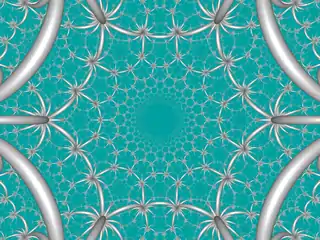 Perspective projection view from center of Poincaré disk model | |
| Type | Hyperbolic regular honeycomb Paracompact uniform honeycomb |
| Schläfli symbol | {6,3,6} {6,3[3]} |
| Coxeter diagram | |
| Cells | {6,3} |
| Faces | hexagon {6} |
| Edge figure | hexagon {6} |
| Vertex figure | {3,6} or {3[3]} |
| Dual | Self-dual |
| Coxeter group | , [6,3,6] , [6,3[3]] |
| Properties | Regular, quasiregular |
The Schläfli symbol of the hexagonal tiling honeycomb is {6,3,6}. Since that of the hexagonal tiling of the plane is {6,3}, this honeycomb has six such hexagonal tilings meeting at each edge. Since the Schläfli symbol of the triangular tiling is {3,6}, the vertex figure of this honeycomb is a triangular tiling. Thus, infinitely many hexagonal tilings meet at each vertex of this honeycomb.[1]
A geometric honeycomb is a space-filling of polyhedral or higher-dimensional cells, so that there are no gaps. It is an example of the more general mathematical tiling or tessellation in any number of dimensions.
Honeycombs are usually constructed in ordinary Euclidean ("flat") space, like the convex uniform honeycombs. They may also be constructed in non-Euclidean spaces, such as hyperbolic uniform honeycombs. Any finite uniform polytope can be projected to its circumsphere to form a uniform honeycomb in spherical space.
Related tilings
The order-6 hexagonal tiling honeycomb is analogous to the 2D hyperbolic infinite-order apeirogonal tiling, {∞,∞}, with infinite apeirogonal faces, and with all vertices on the ideal surface.
It contains ![]()
![]()
![]()
![]()
![]() and
and ![]()
![]()
![]()
![]()
![]() that tile 2-hypercycle surfaces, which are similar to the paracompact tilings
that tile 2-hypercycle surfaces, which are similar to the paracompact tilings ![]()
![]()
![]()
![]()
![]() and
and ![]()
![]()
![]()
![]()
![]() (the truncated infinite-order triangular tiling and order-3 apeirogonal tiling, respectively):
(the truncated infinite-order triangular tiling and order-3 apeirogonal tiling, respectively):
Symmetry
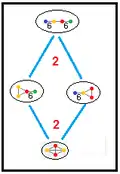
The order-6 hexagonal tiling honeycomb has a half-symmetry construction: ![]()
![]()
![]()
![]()
![]() .
.
It also has an index-6 subgroup, [6,3*,6], with a non-simplex fundamental domain. This subgroup corresponds to a Coxeter diagram with six order-3 branches and three infinite-order branches in the shape of a triangular prism: ![]()
![]()
![]()
![]()
![]()
![]()
![]() .
.
Related polytopes and honeycombs
The order-6 hexagonal tiling honeycomb is a regular hyperbolic honeycomb in 3-space, and one of eleven paracompact honeycombs in 3-space.
| 11 paracompact regular honeycombs | |||||||||||
|---|---|---|---|---|---|---|---|---|---|---|---|
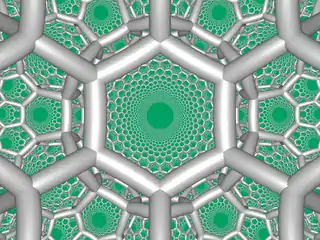 {6,3,3} |
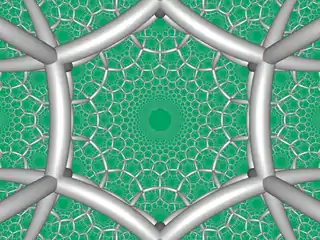 {6,3,4} |
 {6,3,5} |
 {6,3,6} |
 {4,4,3} |
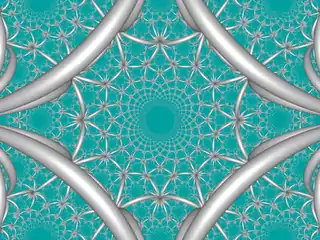 {4,4,4} | ||||||
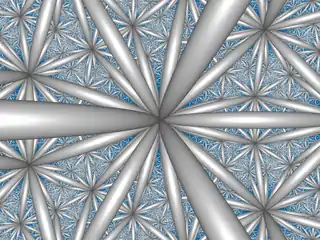 {3,3,6} |
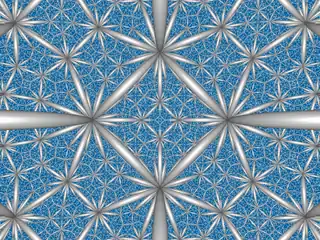 {4,3,6} |
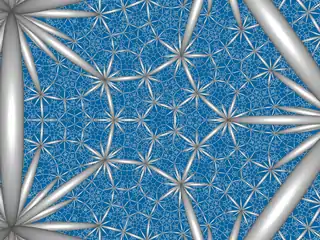 {5,3,6} |
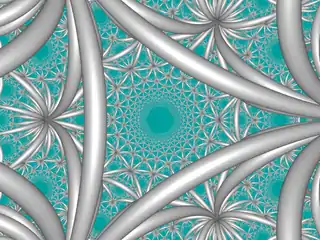 {3,6,3} |
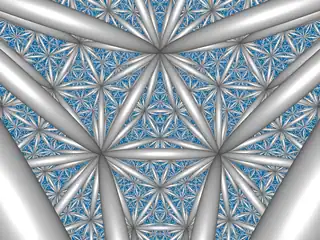 {3,4,4} | |||||||
There are nine uniform honeycombs in the [6,3,6] Coxeter group family, including this regular form.
| {6,3,6} |
r{6,3,6} |
t{6,3,6} |
rr{6,3,6} |
t0,3{6,3,6} |
2t{6,3,6} |
tr{6,3,6} |
t0,1,3{6,3,6} |
t0,1,2,3{6,3,6} |
|---|---|---|---|---|---|---|---|---|
 |
 |
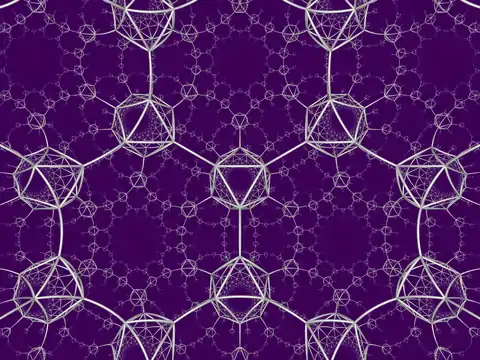 |
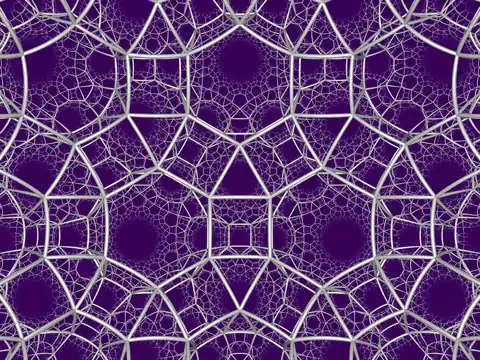 |
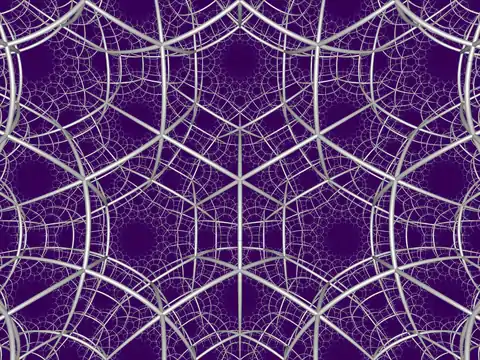 |
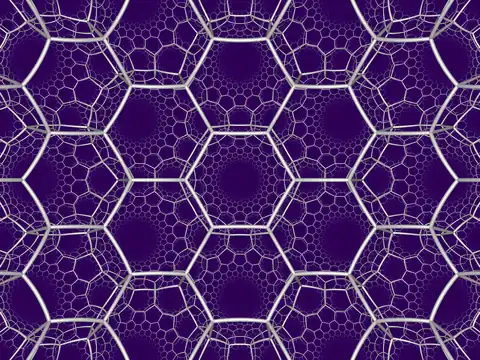 |
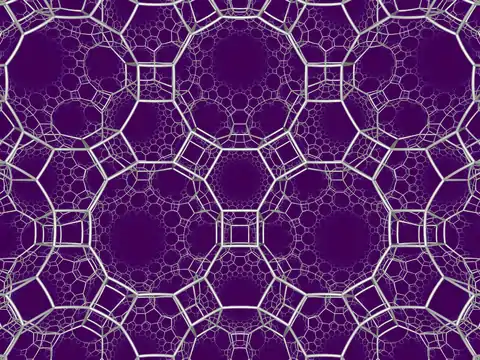 |
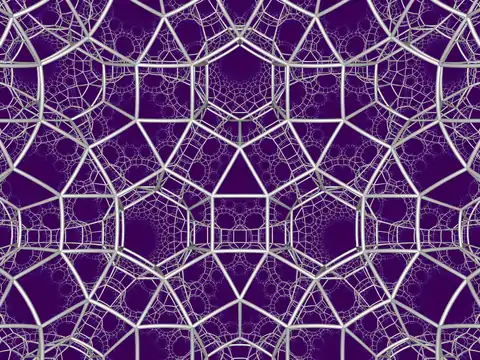 |
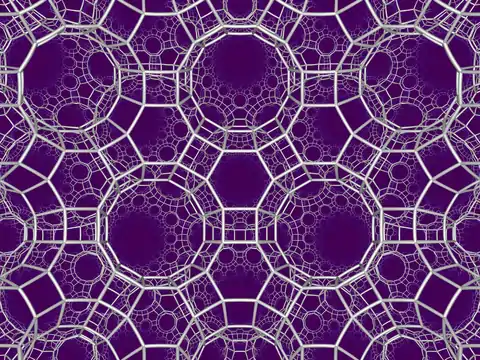 |
This honeycomb has a related alternated honeycomb, the triangular tiling honeycomb, but with a lower symmetry: ![]()
![]()
![]()
![]()
![]()
![]()
![]() ↔
↔ ![]()
![]()
![]()
![]()
![]() .
.
The order-6 hexagonal tiling honeycomb is part of a sequence of regular polychora and honeycombs with triangular tiling vertex figures:
| Form | Paracompact | Noncompact | |||||
|---|---|---|---|---|---|---|---|
| Name | {3,3,6} | {4,3,6} | {5,3,6} | {6,3,6} | {7,3,6} | {8,3,6} | ... {∞,3,6} |
| Image |  |
 |
 |
 |
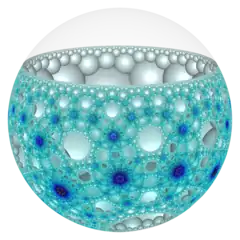 |
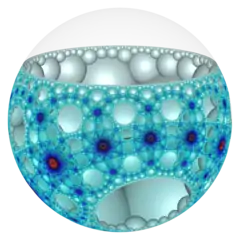 |
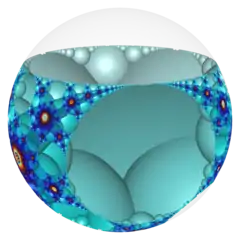 |
| Cells | {3,3} |
{4,3} |
{5,3} |
{6,3} |
{7,3} |
{8,3} |
{∞,3} |
It is also part of a sequence of regular polychora and honeycombs with hexagonal tiling cells:
| {6,3,p} honeycombs | |||||||||||
|---|---|---|---|---|---|---|---|---|---|---|---|
| Space | H3 | ||||||||||
| Form | Paracompact | Noncompact | |||||||||
| Name | {6,3,3} | {6,3,4} | {6,3,5} | {6,3,6} | {6,3,7} | {6,3,8} | ... {6,3,∞} | ||||
| Coxeter |
|||||||||||
| Image |  |
 |
 |
 |
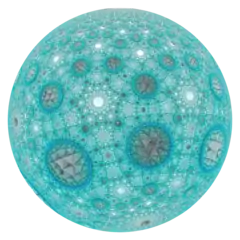 |
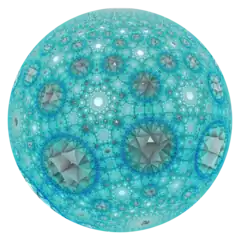 |
 | ||||
| Vertex figure {3,p} |
{3,3} |
{3,4} |
{3,5} |
{3,6} |
{3,7} |
{3,8} |
{3,∞} | ||||
It is also part of a sequence of regular polychora and honeycombs with regular deltahedral vertex figures:
| {p,3,p} regular honeycombs | |||||||||||
|---|---|---|---|---|---|---|---|---|---|---|---|
| Space | S3 | Euclidean E3 | H3 | ||||||||
| Form | Finite | Affine | Compact | Paracompact | Noncompact | ||||||
| Name | {3,3,3} | {4,3,4} | {5,3,5} | {6,3,6} | {7,3,7} | {8,3,8} | ...{∞,3,∞} | ||||
| Image | 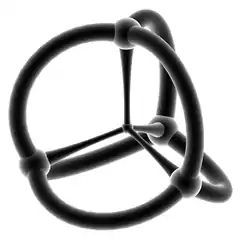 |
 |
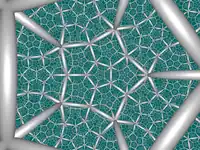 |
 |
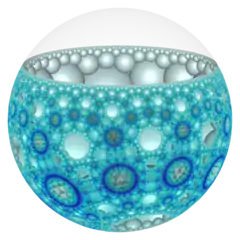 |
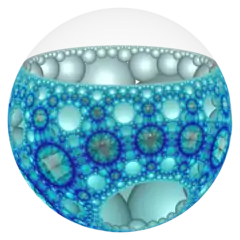 |
 | ||||
| Cells |  {3,3} |
 {4,3} |
 {5,3} |
 {6,3} |
 {7,3} |
 {8,3} |
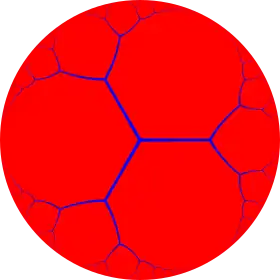 {∞,3} | ||||
| Vertex figure |
 {3,3} |
 {3,4} |
 {3,5} |
 {3,6} |
 {3,7} |
 {3,8} |
 {3,∞} | ||||
Rectified order-6 hexagonal tiling honeycomb
| Rectified order-6 hexagonal tiling honeycomb | |
|---|---|
| Type | Paracompact uniform honeycomb |
| Schläfli symbols | r{6,3,6} or t1{6,3,6} |
| Coxeter diagrams | |
| Cells | {3,6} r{6,3} |
| Faces | triangle {3} hexagon {6} |
| Vertex figure |  hexagonal prism |
| Coxeter groups | , [6,3,6] , [6,3[3]] , [3[3,3]] |
| Properties | Vertex-transitive, edge-transitive |
The rectified order-6 hexagonal tiling honeycomb, t1{6,3,6}, ![]()
![]()
![]()
![]()
![]()
![]()
![]() has triangular tiling and trihexagonal tiling facets, with a hexagonal prism vertex figure.
has triangular tiling and trihexagonal tiling facets, with a hexagonal prism vertex figure.
it can also be seen as a quarter order-6 hexagonal tiling honeycomb, q{6,3,6}, ![]()
![]()
![]()
![]()
![]()
![]()
![]() ↔
↔ ![]()
![]()
![]() .
.

It is analogous to 2D hyperbolic order-4 apeirogonal tiling, r{∞,∞} with infinite apeirogonal faces, and with all vertices on the ideal surface.
Related honeycombs
The order-6 hexagonal tiling honeycomb is part of a series of honeycombs with hexagonal prism vertex figures:
| Space | H3 | ||||||
|---|---|---|---|---|---|---|---|
| Form | Paracompact | Noncompact | |||||
| Name | r{3,3,6} |
r{4,3,6} |
r{5,3,6} |
r{6,3,6} |
r{7,3,6} |
... r{∞,3,6} | |
| Image | 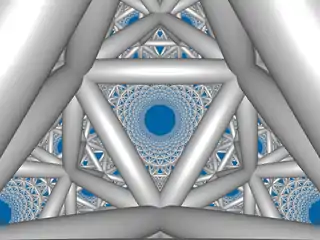 |
 |
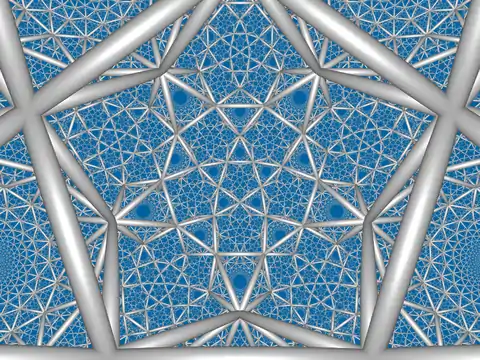 |
 |
|||
| Cells {3,6} |
r{3,3} |
r{4,3} |
r{5,3} |
r{6,3} |
r{7,3} |
r{∞,3} | |
It is also part of a matrix of 3-dimensional quarter honeycombs: q{2p,4,2q}
| Euclidean/hyperbolic(paracompact/noncompact) quarter honeycombs q{p,3,q} | |||||||||||
|---|---|---|---|---|---|---|---|---|---|---|---|
| p \ q | 4 | 6 | 8 | ... ∞ | |||||||
| 4 |  q{4,3,4} |
q{4,3,6} |
q{4,3,8} |
q{4,3,∞} | |||||||
| 6 | q{6,3,4} |
 q{6,3,6} |
q{6,3,8} |
q{6,3,∞} | |||||||
| 8 | q{8,3,4} |
q{8,3,6} |
q{8,3,8} |
q{8,3,∞} | |||||||
| ... ∞ | q{∞,3,4} |
q{∞,3,6} |
q{∞,3,8} |
q{∞,3,∞} | |||||||
Truncated order-6 hexagonal tiling honeycomb
| Truncated order-6 hexagonal tiling honeycomb | |
|---|---|
| Type | Paracompact uniform honeycomb |
| Schläfli symbol | t{6,3,6} or t0,1{6,3,6} |
| Coxeter diagram | |
| Cells | {3,6} t{6,3} |
| Faces | triangle {3} dodecagon {12} |
| Vertex figure |  hexagonal pyramid |
| Coxeter groups | , [6,3,6] , [6,3[3]] |
| Properties | Vertex-transitive |
The truncated order-6 hexagonal tiling honeycomb, t0,1{6,3,6}, ![]()
![]()
![]()
![]()
![]()
![]()
![]() has triangular tiling and truncated hexagonal tiling facets, with a hexagonal pyramid vertex figure.[2]
has triangular tiling and truncated hexagonal tiling facets, with a hexagonal pyramid vertex figure.[2]

Bitruncated order-6 hexagonal tiling honeycomb
| Bitruncated order-6 hexagonal tiling honeycomb | |
|---|---|
| Type | Paracompact uniform honeycomb |
| Schläfli symbol | bt{6,3,6} or t1,2{6,3,6} |
| Coxeter diagram | |
| Cells | t{3,6} |
| Faces | hexagon {6} |
| Vertex figure |  tetrahedron |
| Coxeter groups | , [[6,3,6]] , [6,3[3]] , [3,3,6] |
| Properties | Regular |
The bitruncated order-6 hexagonal tiling honeycomb is a lower symmetry construction of the regular hexagonal tiling honeycomb, ![]()
![]()
![]()
![]()
![]()
![]()
![]() ↔
↔ ![]()
![]()
![]()
![]()
![]()
![]()
![]() . It contains hexagonal tiling facets, with a tetrahedron vertex figure.
. It contains hexagonal tiling facets, with a tetrahedron vertex figure.

Cantellated order-6 hexagonal tiling honeycomb
| Cantellated order-6 hexagonal tiling honeycomb | |
|---|---|
| Type | Paracompact uniform honeycomb |
| Schläfli symbol | rr{6,3,6} or t0,2{6,3,6} |
| Coxeter diagram | |
| Cells | r{3,6} rr{6,3} {}x{6} |
| Faces | triangle {3} square {4} hexagon {6} |
| Vertex figure |  wedge |
| Coxeter groups | , [6,3,6] , [6,3[3]] |
| Properties | Vertex-transitive |
The cantellated order-6 hexagonal tiling honeycomb, t0,2{6,3,6}, ![]()
![]()
![]()
![]()
![]()
![]()
![]() has trihexagonal tiling, rhombitrihexagonal tiling, and hexagonal prism cells, with a wedge vertex figure.
has trihexagonal tiling, rhombitrihexagonal tiling, and hexagonal prism cells, with a wedge vertex figure.

Cantitruncated order-6 hexagonal tiling honeycomb
| Cantitruncated order-6 hexagonal tiling honeycomb | |
|---|---|
| Type | Paracompact uniform honeycomb |
| Schläfli symbol | tr{6,3,6} or t0,1,2{6,3,6} |
| Coxeter diagram | |
| Cells | tr{3,6} t{3,6} {}x{6} |
| Faces | triangle {3} square {4} hexagon {6} dodecagon {12} |
| Vertex figure |  mirrored sphenoid |
| Coxeter groups | , [6,3,6] , [6,3[3]] |
| Properties | Vertex-transitive |
The cantitruncated order-6 hexagonal tiling honeycomb, t0,1,2{6,3,6}, ![]()
![]()
![]()
![]()
![]()
![]()
![]() has hexagonal tiling, truncated trihexagonal tiling, and hexagonal prism cells, with a mirrored sphenoid vertex figure.
has hexagonal tiling, truncated trihexagonal tiling, and hexagonal prism cells, with a mirrored sphenoid vertex figure.

Runcinated order-6 hexagonal tiling honeycomb
| Runcinated order-6 hexagonal tiling honeycomb | |
|---|---|
| Type | Paracompact uniform honeycomb |
| Schläfli symbol | t0,3{6,3,6} |
| Coxeter diagram | |
| Cells | {6,3} {}×{6} |
| Faces | triangle {3} square {4} hexagon {6} |
| Vertex figure |  triangular antiprism |
| Coxeter groups | , [[6,3,6]] |
| Properties | Vertex-transitive, edge-transitive |
The runcinated order-6 hexagonal tiling honeycomb, t0,3{6,3,6}, ![]()
![]()
![]()
![]()
![]()
![]()
![]() has hexagonal tiling and hexagonal prism cells, with a triangular antiprism vertex figure.
has hexagonal tiling and hexagonal prism cells, with a triangular antiprism vertex figure.

It is analogous to the 2D hyperbolic rhombihexahexagonal tiling, rr{6,6}, ![]()
![]()
![]()
![]()
![]() with square and hexagonal faces:
with square and hexagonal faces:
Runcitruncated order-6 hexagonal tiling honeycomb
| Runcitruncated order-6 hexagonal tiling honeycomb | |
|---|---|
| Type | Paracompact uniform honeycomb |
| Schläfli symbol | t0,1,3{6,3,6} |
| Coxeter diagram | |
| Cells | t{6,3} rr{6,3} {}x{6} {}x{12} |
| Faces | triangle {3} square {4} hexagon {6} dodecagon {12} |
| Vertex figure | isosceles-trapezoidal pyramid |
| Coxeter groups | , [6,3,6] |
| Properties | Vertex-transitive |
The runcitruncated order-6 hexagonal tiling honeycomb, t0,1,3{6,3,6}, ![]()
![]()
![]()
![]()
![]()
![]()
![]() has truncated hexagonal tiling, rhombitrihexagonal tiling, hexagonal prism, and dodecagonal prism cells, with an isosceles-trapezoidal pyramid vertex figure.
has truncated hexagonal tiling, rhombitrihexagonal tiling, hexagonal prism, and dodecagonal prism cells, with an isosceles-trapezoidal pyramid vertex figure.

Omnitruncated order-6 hexagonal tiling honeycomb
| Omnitruncated order-6 hexagonal tiling honeycomb | |
|---|---|
| Type | Paracompact uniform honeycomb |
| Schläfli symbol | t0,1,2,3{6,3,6} |
| Coxeter diagram | |
| Cells | tr{6,3} {}x{12} |
| Faces | square {4} hexagon {6} dodecagon {12} |
| Vertex figure |  phyllic disphenoid |
| Coxeter groups | , [[6,3,6]] |
| Properties | Vertex-transitive |
The omnitruncated order-6 hexagonal tiling honeycomb, t0,1,2,3{6,3,6}, ![]()
![]()
![]()
![]()
![]()
![]()
![]() has truncated trihexagonal tiling and dodecagonal prism cells, with a phyllic disphenoid vertex figure.
has truncated trihexagonal tiling and dodecagonal prism cells, with a phyllic disphenoid vertex figure.

Alternated order-6 hexagonal tiling honeycomb
| Alternated order-6 hexagonal tiling honeycomb | |
|---|---|
| Type | Paracompact uniform honeycomb |
| Schläfli symbols | h{6,3,6} |
| Coxeter diagrams | |
| Cells | {3,6} {3[3]} |
| Faces | triangle {3} |
| Vertex figure |  hexagonal tiling |
| Coxeter groups | , [6,3[3]] |
| Properties | Regular, quasiregular |
The alternated order-6 hexagonal tiling honeycomb is a lower-symmetry construction of the regular triangular tiling honeycomb, ![]()
![]()
![]()
![]()
![]()
![]()
![]() ↔
↔ ![]()
![]()
![]()
![]()
![]() . It contains triangular tiling facets in a hexagonal tiling vertex figure.
. It contains triangular tiling facets in a hexagonal tiling vertex figure.
Cantic order-6 hexagonal tiling honeycomb
| Cantic order-6 hexagonal tiling honeycomb | |
|---|---|
| Type | Paracompact uniform honeycomb |
| Schläfli symbols | h2{6,3,6} |
| Coxeter diagrams | |
| Cells | t{3,6} r{6,3} h2{6,3} |
| Faces | triangle {3} hexagon {6} |
| Vertex figure |  triangular prism |
| Coxeter groups | , [6,3[3]] |
| Properties | Vertex-transitive, edge-transitive |
The cantic order-6 hexagonal tiling honeycomb is a lower-symmetry construction of the rectified triangular tiling honeycomb, ![]()
![]()
![]()
![]()
![]()
![]()
![]() ↔
↔ ![]()
![]()
![]()
![]()
![]() , with trihexagonal tiling and hexagonal tiling facets in a triangular prism vertex figure.
, with trihexagonal tiling and hexagonal tiling facets in a triangular prism vertex figure.
Runcic order-6 hexagonal tiling honeycomb
| Runcic order-6 hexagonal tiling honeycomb | |
|---|---|
| Type | Paracompact uniform honeycomb |
| Schläfli symbols | h3{6,3,6} |
| Coxeter diagrams | |
| Cells | rr{3,6} {6,3} {3[3]} {3}x{} |
| Faces | triangle {3} square {4} hexagon {6} |
| Vertex figure |  triangular cupola |
| Coxeter groups | , [6,3[3]] |
| Properties | Vertex-transitive |
The runcic hexagonal tiling honeycomb, h3{6,3,6}, ![]()
![]()
![]()
![]()
![]()
![]()
![]() , or
, or ![]()
![]()
![]()
![]()
![]() , has hexagonal tiling, rhombitrihexagonal tiling, triangular tiling, and triangular prism facets, with a triangular cupola vertex figure.
, has hexagonal tiling, rhombitrihexagonal tiling, triangular tiling, and triangular prism facets, with a triangular cupola vertex figure.
Runicantic order-6 hexagonal tiling honeycomb
| Runcicantic order-6 hexagonal tiling honeycomb | |
|---|---|
| Type | Paracompact uniform honeycomb |
| Schläfli symbols | h2,3{6,3,6} |
| Coxeter diagrams | |
| Cells | tr{6,3} t{6,3} h2{6,3} {}x{3} |
| Faces | triangle {3} square {4} hexagon {6} dodecagon {12} |
| Vertex figure |  rectangular pyramid |
| Coxeter groups | , [6,3[3]] |
| Properties | Vertex-transitive |
The runcicantic order-6 hexagonal tiling honeycomb, h2,3{6,3,6}, ![]()
![]()
![]()
![]()
![]()
![]()
![]() , or
, or ![]()
![]()
![]()
![]()
![]() , contains truncated trihexagonal tiling, truncated hexagonal tiling, trihexagonal tiling, and triangular prism facets, with a rectangular pyramid vertex figure.
, contains truncated trihexagonal tiling, truncated hexagonal tiling, trihexagonal tiling, and triangular prism facets, with a rectangular pyramid vertex figure.
See also
References
- Coxeter The Beauty of Geometry, 1999, Chapter 10, Table III
- Twitter Rotation around 3 fold axis
- Coxeter, Regular Polytopes, 3rd. ed., Dover Publications, 1973. ISBN 0-486-61480-8. (Tables I and II: Regular polytopes and honeycombs, pp. 294–296)
- The Beauty of Geometry: Twelve Essays (1999), Dover Publications, LCCN 99-35678, ISBN 0-486-40919-8 (Chapter 10, Regular Honeycombs in Hyperbolic Space) Table III
- Jeffrey R. Weeks The Shape of Space, 2nd edition ISBN 0-8247-0709-5 (Chapter 16-17: Geometries on Three-manifolds I,II)
- Norman Johnson Uniform Polytopes, Manuscript
- N.W. Johnson: The Theory of Uniform Polytopes and Honeycombs, Ph.D. Dissertation, University of Toronto, 1966
- N.W. Johnson: Geometries and Transformations, (2018) Chapter 13: Hyperbolic Coxeter groups


